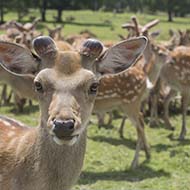New diagnostic tool for Johne's disease

"Actiphage was found to be a useful screening test before animals were moved to reduce the risk of spread of infection." - Dr Cath Rees.
A new study has discovered that Actiphage, a new diagnostic, can directly detect the presence of Johne's disease in farmed deer.
Johne's disease, a chronic wasting condition that results in reduced meat yields, lower fertility and premature death, has previously been difficult to detect. However, a new proof of concept study has shown that Actiphage can directly detect the presence of the causal mycobacteria in cervid blood samples.
Published in Frontiers in Veterinary Science, the study blind tested 132 animals from four production units to detect carriers of the disease.
Actiphage detected the causal bacteria Mycobacterium avium subsp paratuberculosis (MAP) predominantly in one breeding unit and in a small number of animals in another.
Upon re-testing the MAP-positive animals were found to test positively again, making the results of the study reproducible.
Dr Cath Rees, one of the study's authors, and associate professor of Microbiology at the University of Nottingham, commented: “Early identification of carriers using Actiphage allowed the introduction of a disease management strategy on the farm.
“In addition, Actiphage was found to be a useful additional screening test before animals were moved to reduce the risk of spread of infection.”
It is hoped that the findings of this study will assist in restricting the progression of Johne's disease through a herd, as its reliable identification of the mycobacteria at an early stage of infection can allow for the farmer to then isolate the infected animal.



 The Veterinary Medicines Directorate (VMD) is inviting applications from veterinary students to attend a one-week extramural studies (EMS) placement in July 2026.
The Veterinary Medicines Directorate (VMD) is inviting applications from veterinary students to attend a one-week extramural studies (EMS) placement in July 2026.